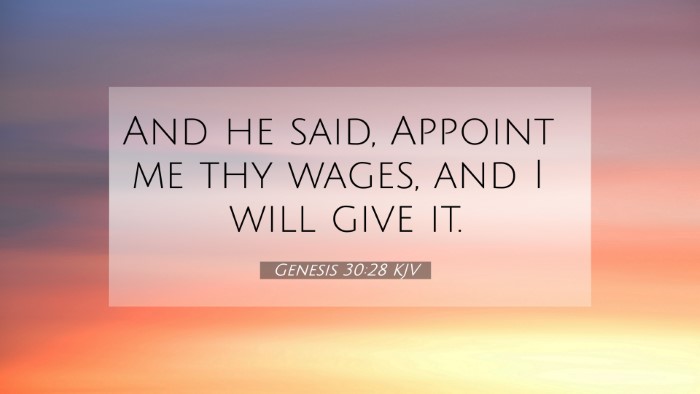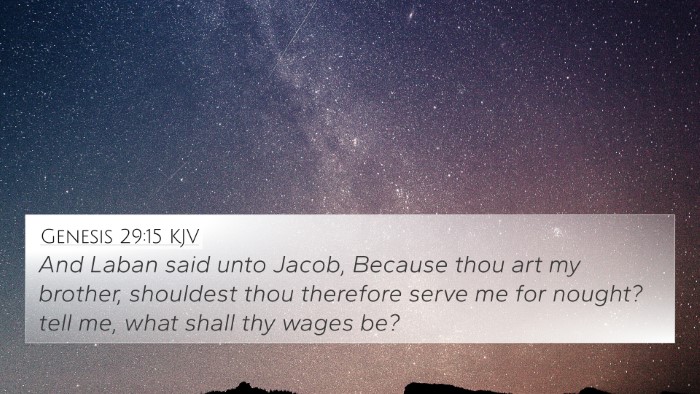Understanding Genesis 30:28
Genesis 30:28 states, "And he said, Appoint me thy wages, and I will give it." This verse occurs in the context of Jacob's labor for Laban, where he negotiates his compensation for the sheep and goats he tends. The verse encapsulates themes of negotiation, trust, and the importance of fair compensation. Below is an analysis combining insights from respected public domain commentaries.
Summary of Insights
This verse illustrates the dynamic between Jacob and Laban, revealing not only the pressures of labor but also the shrewdness required in their relationship. The following insights emerge from commentaries:
- Matthew Henry: Jacob's request for wages reflects his desire for fairness after years of service. Henry emphasizes God's providence in Jacob's life, asserting that God rewards those who are diligent and labor faithfully.
- Albert Barnes: Barnes notes the strategic nature of Jacob’s approach. By asking Laban to set his own wages, Jacob cleverly puts pressure on Laban while protecting himself from future exploitation. This highlights the need for discernment in business dealings.
- Adam Clarke: Clarke offers insights on the implications of Jacob’s negotiation skills in a foreign land. He comments on the ethical implications of his labor, signifying that one's work should be valued and compensated fairly, reflecting a broader Biblical principle concerning just wages.
Thematic Connections
This verse invites reflection on broader Biblical themes. The negotiation that Jacob engages in can be paralleled with the following Biblical principles and verses:
- Luke 10:7: "And in the same house remain, eating and drinking such things as they give: for the labourer is worthy of his hire." This verse reinforces the value of fair compensation for work.
- 1 Timothy 5:18: "For the scripture saith, Thou shalt not muzzle the ox that treadeth out the corn. And, The labourer is worthy of his reward." Again stressing the Biblical stance on wages.
- Proverbs 16:8: "Better is a little with righteousness than great revenues without right." This alludes to ethical considerations in wealth accumulation.
- Exodus 22:15: "If a man borrow ought of his neighbor, and it be hurt, or die, the owner thereof being not with it, he shall surely make it good." This establishes a moral obligation in business transactions.
- James 5:4: "Behold, the hire of the labourers who have reaped down your fields, which is of you kept back by fraud, crieth: and the cries of them which have reaped are entered into the ears of the Lord of sabaoth." A warning about the consequences of unfair labor practices.
- Colossians 3:23-24: "And whatsoever ye do, do it heartily, as to the Lord, and not unto men; Knowing that of the Lord ye shall receive the reward of the inheritance: for ye serve the Lord Christ." highlights the need for integrity in labor.
- Matthew 20:1-16: The parable of the laborers in the vineyard compares the treatment of workers and the nature of wages in a morally complex manner.
Cross-Referencing and Comparative Analysis
In conducting a comparative Bible verse analysis, we identify how Genesis 30:28 connects to various themes through scriptural cross-referencing:
- Negotiation in Relationships: Genesis 31:6 can be cross-referenced where Jacob speaks of his integrity and treatment under Laban’s watch.
- The Role of Trust: Proverbs 22:1 highlights the importance of a good name, anchoring the trust necessary in Jacob's dealings with Laban.
- Labor and Divine Provision: Philippians 4:19 parallels the faith in God's provision for those who work.
Tools for Cross-Referencing
For those interested in further exploring cross-referencing in Bible study, consider these tools:
- Bible concordances that list every mention of terms associated with labor and payment.
- Bible cross-reference guides that provide thematic links.
- Cross-reference Bible study methods focusing on inter-Biblical dialogue through different scriptural eras.
Conclusion
Genesis 30:28, while seemingly a simple statement, opens up a realm of insight concerning labor, trust, and negotiation. Through understanding this verse, we not only comprehend Jacob's situation but also derive a broader understanding of Biblical principles that guide ethical interactions in today's world. By linking various Bible verses and employing effective cross-referencing techniques, readers can deepen their understanding of scriptural connections.




